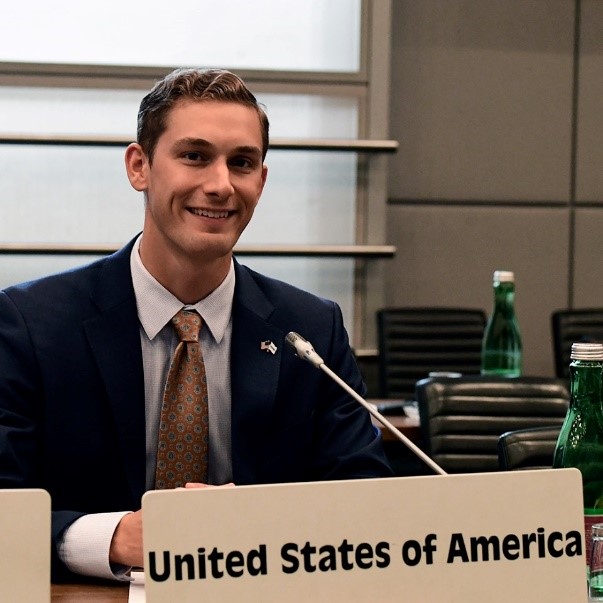Max Loebl Reflects on His Summer Internship at OSOSCE
By Max Loebl, MALD 2020 Candidate, The Fletcher School
Rising up from the heart of Vienna, the Hofburg, Vienna’s Imperial Palace, is simply a spectacular sight. The Palace, once home to the Hapsburgs, has an amalgamation of architectural styles reflecting 700 years of Austrian history and the transitions of political power throughout the course of the Austrian empire. Today, horse and carriages, tourists, and street performers keep the remarkable building and its grounds abuzz. Despite the ornate, mesmerizing exterior, the events inside are what make the Hofburg truly exciting. The Organization for Security and Cooperation in Europe (OSCE) is headquartered within the Hofburg and hosts OSCE permanent councils on a weekly basis where member states convene to discuss and resolve Europe’s most pressing security, humanitarian, and political issues.
This summer I had the amazing opportunity to intern with the U.S. Mission to the Organization for Security and Cooperation in Europe at the U.S. Mission in Vienna, Austria. I work primarily in the public affairs section, so I frequently attended OSCE Permanent Council meetings, corresponded with media partners in the United States and Europe, and amplifyed messages from Washington and other embassies in Europe. The OSCE is a fascinating organization because of its all-encompassing membership and stipulated unanimous consent. It is an exceptionally inclusive security organization spreading all the way from Vancouver to Vladivostok with 57 member states. Presently, conflicts in Ukraine’s Donbas and Russia’s annexation of Crimea dominate discussion at the U. S. Mission and at the OSCE Permanent Council. Moreover, I frequently followed and tracked developments related to the OSCE’s Special Monitoring Mission in Ukraine. Furthermore, our office is exceptionally active in promoting freedom of media, protection of journalists, and countering disinformation in OSCE member states.
Since the OSCE is so comprehensive, and because policy issues related to Russia and Eurasia are of particular importance, it was essential for me to sharpen my Russian language skills while in Vienna. Accordingly, I studied in a program through the Diplomatic Academy of Vienna which fits well with my skill set and language learning needs. I previously studied Russian language throughout my undergraduate career at Lawrence University, but regrettably some of it slipped since graduation. However, after a few arduous weeks of more introductory lessons, I feel my Russian speaking habits beginning to return. I especially enjoy individual tutoring with my instructor, as it allowed for tailored vocabulary building exercises to ensure I had the necessary language related to the OSCE and multilateral diplomacy.
Even with limited time for lessons, my Russian language skills have already been impactful in my daily work. For example, the Russian Spokesman to the OSCE, Alexander Lukashevich, only delivers Russia’s statement in Russian language. Although there are translators present, it is more rewarding to listen to the delivery in Russian to capture the full meaning and emotion behind statements. Moreover, there are a variety of Russian speaking countries that play critical roles in the OSCE. I am extremely grateful for the opportunity to refine my Russian while interning in such an intriguing role. I cannot wait to return to my academic studies to continue applying the professional and language skills I have learned while with the USOSCE.


